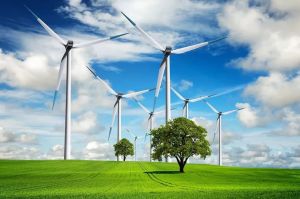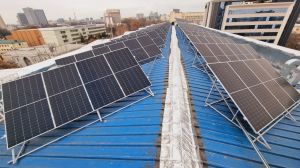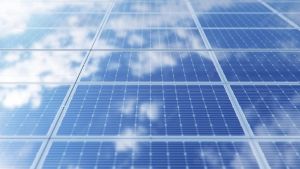One of the most important prerequisites for the development of modern Uzbekistan is the country's economic stability, which largely depends on achieving energy security. Development and liberalization of the economy are among the top five priorities of the country's development, as provided for in the Strategy for development of Uzbekistan for 2017-2021. An effective energy policy is the basis for improving the competitiveness of the national economy. In this regard, the energy sector is currently going through structural changes, modernization and diversification.
The Ministry of Energy of the Republic of Uzbekistan in its present form was established by the President’s Decree of 01.02.2019 “On measures to Radically Improve the Management System of the Fuel and Energy Industry of the Republic of Uzbekistan”. The Ministry of Energy regulates the production, transmission, distribution and consumption of electric and thermal energy, coal, as well as extraction, processing, transportation, distribution, sale and use of oil, gas and their products.
The Ministry of Energy has a number of objectives, including:
- Regulation of the energy sector;
- Implementation of production sharing agreements and supervision of their execution;
- Development of PPP (public-private partnership) arrangements;
- Improving the tariff policy to facilitate the formation of a competitive business environment, increasing and diversifying energy production;
- Implementation of modern corporate governance in the energy sector, including taking into account the World Bank's proposal to optimize production processes.
What has been done?
- Radical restructuring of Uzbekenergo JSC, initiated by the President, was carried out in order to reform the energy industry.
- Three joint-stock companies have been organized under the umbrella of Uzbekenergo JSC: Thermal Power Plants, National Electric Networks of Uzbekistan and Regional Electric Networks.
The purpose of this reorganization is to switch to modern methods of organizing the production, transportation, distribution and sale of electric energy.
- In May 2019 the Law of the Republic of Uzbekistan On the Utilization of Renewable Energy Sources, as well as the Law On Public-Private Partnership were adopted. This formed a regulatory framework for accelerating the implementation of projects in the field of renewable energy sources.
The Ministry of Energy, jointly with other relevant ministries and agencies, and with the technical assistance of international financial institutions (the World Bank, the Asian Development Bank), is developing a Concept for the country's fuel and energy supply for 2020-2030.
The British consultancy company Mott MacDonald contributed to devising of the Masterplan for the long-term development of the electricity sector in Uzbekistan, including renewable energy sources.
The process of large-scale restructuring of the oil and gas system has begun. First of all, it is planned to reduce unnecessary intermediate links in the management system by joining sub-holding companies to Uzbekneftegaz JSC, with the exception of Uztransgaz JSC, which is being withdrawn from the structure of Uzbekneftegaz JSC, and the holding company’s stake in it will be transferred to the government.
The Ministry of Energy is also currently working on developing a strategy for fuel and energy supply of Uzbekistan for 2020-2030 and a comprehensive programme for digitalization of the electric power industry for 2019-2021, which will be aimed at automating the processes of enterprise resource planning (ERP) and dispatching control and data collection (SCADA).
One of the priority areas for the development of Uzbekistan's electric power industry is the development of generating capacities in such areas as thermal power plants (TPP), nuclear power and renewable energy sources (RES) with the support of foreign direct investment.
Another important project is being implemented at an accelerated pace – Introduction of an Automated System for Metering and Control of Electricity (ASMCE)". In particular, by the end of 2020, it is planned to connect more than 7 million consumers to the Automated system for monitoring and metering of electricity. By 18 June 2019, 956,180 units of modern electric meters were installed nationwide.
The Ministry of Energy also aims to promote energy saving measures, as well as introduce appropriate technologies and increase public awareness of the importance of energy saving.
According to experts of Uzenergoinspektziya, today each household has the opportunity to save on average 400 kW/hour of electricity per year. If each family saves 400 kW, nationwide this will amount to 1.8 billion kW/h. The energy saved in this way will be enough, for example, to supply electricity to Jizzakh or Syrdarya regions during the year.
The Ministry of Energy 10 year plan
The electric power sector currently generates more than 14.1 thousand MW.
About 85.8% of this generating capacity comes from thermal power plants. By 2030, the total electrical load during peak hours of consumption will exceed 20,000 MW against 11,000 MW in the autumn-winter period for 2018-2019. Therefore, by 2030, the country will need to generate 1.8 times more electricity than at present. According to the Programme for the implementation of major investment projects in the electric power industry for 2019-2030, in the field of thermal power plants alone it is planned to introduce 15.6 GW of new and modernized generating capacity by 2030. Meanwhile, 6.4 GW of out-dated equipment at thermal power plants is expected to be decommissioned. By 2030 their installed capacity will reach 78.9 thousand MW (the capacity will grow by 6,8 thousand MW).
- The Ministry will continue to work on major investment projects in order to increase the generating capacity of the power sector in the period up to 2030.
- Construction of modern combined cycle plants with a total output of about 10 GW (at Syrdarya, Navoi, Talimarjan, Takhiatash, Turakurgan TPP and others).
- Construction of Hydro-power plants with a total output of 1.9 GW and a nuclear power plant with an output of 2.4 GW.
- Construction of power plants using renewable energy to bring the total share of solar and wind power plants to 21%.
- Construction of manoeuvrable generating facilities based on gas piston units or aviation gas with a total output of about 3 GW.
All these efforts are aimed at ensuring energy security and dynamic development of Uzbekistan.
Overall, the Ministry of Energy is responsible for
- Implementation of a unified energy policy aimed at ensuring the country's energy security and meeting the growing demand of the country's economy and population for energy resources;
- Delineating the functions of government regulation and economic activity in the energy sector, improving the legal and institutional framework for social and public-private partnership, developing clear market mechanisms for implementing tariff policy and promoting the principles of a healthy competitive environment;
- Creating conditions to actively attract investments, primarily foreign direct investments, into the construction of infrastructure facilities, as well as the modernization, technical and technological re-equipment of industry enterprises;
- Government policy in the field of energy saving and reducing the energy intensity of the economy, encouraging the active introduction of advanced resource-and energy-saving technologies in the economy and household sector, and the widespread development of alternative energy sources;
- Wide implementation of modern automation tools for technological processes, accounting systems for production, supply, and consumption of energy resources at energy industry enterprises;
- Optimization of the management system of industry enterprises, their structures and divisions, introduction of modern methods of work organization and target indicators (quality management, indicative planning) aimed at achieving specific results.










